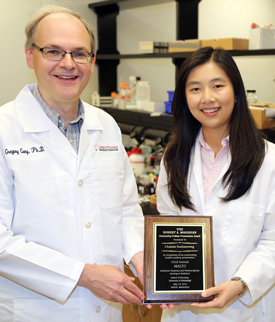Research News
Building Better Inhibitors
UH Chemistry Graduate Student's Project in UHCOP Lab to Design Selective Inhibitors of Regulated Cell Death Wins Award at MALTO Regional Meeting
Based on research conducted in the lab of UH College of Pharmacy's Gregory Cuny, Ph.D., UH graduate Chemistry student Chalada Suebsuwong won a top presentation award at the 42nd Annual MALTO Medicinal Chemistry & Pharmacognosy Meeting-in-Miniature May 17-19 at the University of Mississippi.
Suebsuwong's presentation, entitled "Structure-based design of potent and selective DLG-out RIPK1 inhibitors," was selected for the Robert A. Magarian Outstanding Podium Presentation Award among 16 graduate student podium presentations at the MALTO (Mississippi, Alabama, Louisiana, Texas and Oklahoma) meeting.

The presentation described the project team's work to develop novel or hybrid compounds inhibitors of the Receptor Interacting Protein Kinase 1 (RIPK1), a key mediator of a process called regulated necrosis. A form of cell death, necroptosis is potentially involved in cerebral ischemia (or stroke), myocardial infarction, neurodegenerative diseases, and a variety of other pathological conditions.
The inhibitors were designed based on ponatinib, a clinically approved inhibitor of Abl kinase used to treat chronic myeloid leukemia. The research team utilized structural differences between Abl kinase and RIPK1 to develop compounds that selectively target RIPK1. In addition, the team designed hybrid compound of ponatinib and necrostatin (a previously discovered class of RIPK1 inhibitors) that exhibits better activity at blocking regulated necrosis in cell models compared to either necrostatin or ponatinib. Overall, this study provided two new strategies for the design of selective RIPK1 inhibitors that will help in the development of new drugs for the treatment of conditions involving regulated necrotic cell death.
In addition to Cuny, Suebsuwong's coauthors included researchers Malek Najjar, Jenny L. Maki, Saumil Shah, Danish Saleh and Alexei Degterev, all of Tufts University School of Medicine; Soumya S. Ray of Brigham & Women's Hospital and Harvard Medical School; Roshan J. Thapa, Shoko Nogusa and Siddarth Balachandran, all of Fox Chase Cancer Center; Peter J. Gough and John Bertin of GlaxoSmithKline; and Junying Yuan of Harvard Medical School.
This is the second time Suebsuowong has been recognized at MALTO. In 2013, she won the Thomas L. Lemke Outstanding Student Poster Presentation Award for her previous project with Cuny, “An Approach to Identifying Potent and Selective DXG-out RIP1 Kinase Inhibitors.” Lemke is an associate professor emeritus of UHCOP and one of the co-founders of MALTO with Magarian, professor emeritus University of Oklahoma Health Sciences College of Pharmacy.
Serving as the site of the first MALTO meeting in 1972, the University of Houston will once again serve as host with the 2016 MALTO meeting May 22-24.